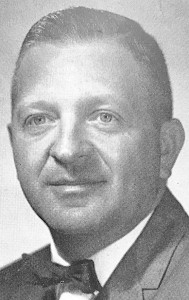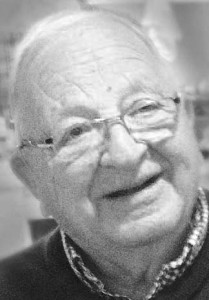A beloved father figure to generations of youth who needed love, understanding and guidance has been lost, but his legacy and lessons live on in the people he touched and the local institution he helped build and shape.
Bill Matus, the first executive director of Camp Oakland, which changed its name to Crossroads for Youth in 1999, passed away on Nov. 17, 2016. He was 94.

“He was a man of integrity,” said Dr. Janet McPeek, who retired as Crossroads’ president after 23 years with the private, non-profit treatment agency, located at 930 E. Drahner Rd., that serves at-risk and disadvantaged youth along with their families.
“He was well trained. Very professional. He always had this twinkle in his eye. He was just a fine man.”
Matus served as the executive director of the 320-acre Camp Oakland from 1953 until his retirement in 1983. He returned in 1995 to briefly serve as interim director.
After Marc Porter became president of Crossroads earlier this year, he journeyed to northern Michigan to visit Matus.
Porter found him to be a “very humble man.”
“He never talked about himself at all. It was always about the staff and the kids,” he said. “It was always about the kids that he worked with over the years.”
Matus was well-known and respected for his excellent rapport with the youth he served so diligently.
McPeek described him as “very non-judgmental” and always willing to listen.
“Bill had that gift of being able to meet a kid and talk to them and connect with them,” she said. “Kids can tell who really wants to hear their story and who doesn’t. Bill really wanted to hear their story.”
There was never any doubt that Matus was “completely dedicated” to the kids, “first and foremost,” McPeek said.

In the 1965 book “The New Justice for Children and Families and The Story of Camp Oakland, Inc.,” written by Arthur E. Moore, Matus penned the foreword and his passion for helping kids was quite evident.
“Our programs have been successful because we really care, because these children are indeed our children forever and a day,” he wrote.
Later in the book in a chapter about Matus, Moore wrote, “From the beginning, he has been truly a father to the boys assigned to Camp Oakland. He proved to be not only an affectionate disciplinarian, but a most outstanding community leader.
“He has been a warm-hearted and kindly friend of every boy and girl he has ever contacted. This is the type of person which is required for leadership in work with youth.”
McPeek first met Matus in the 1990s while working as Crossroads’ clinical director. He quickly became both a mentor and a friend. It was his encouragement and support that led to McPeek applying for the executive director position, which she attained in 1995.
“Bill was somebody who had a tremendous impact on me,” she said. “He was definitely a man to be admired.”
McPeek said “the most valuable piece of advice” Matus ever gave her was “remember to enjoy the kids” and “remain focused on why you’re here, which is to serve” them. He told her that if she did this, she would “always make the right decision.”
“That really helped,” McPeek said.
Matus gave Porter the same advice, urging him to remember “it’s not our home, it’s the kids’ home.”
“It’s always about the kids,” he said.
McPeek loved how “flexible” Matus was.
“In all the time that I worked with him, he was so careful about not saying to me, ‘This is how we used to do it and this is how you should do it,’” she said.
Porter agreed that Matus did not believe Crossroads should be run like a museum.
During their visit, Matus told him to, “Honor the past, but don’t get caught up in it. Forge your own path going forward.”
Matus understood an organization must continue to change and evolve in order to meet people’s needs.
For example, when the name changed from Camp Oakland to Crossroads for Youth, McPeek said Matus “was one of the biggest promoters of it.”
“That was one of the things that was absolutely the most endearing about Bill,” she said.
Matus was truly interested in the people around him. It wasn’t just a passing interest. He went out of his way to get to know people both in and out of the professional setting.
“You just never knew where he was going to show up,” McPeek said. “One night he showed up at one of my kid’s baseball games.”
“He wanted to know the whole person before he was going to make any kind of decisions about you,” she explained.

I remember Mr. Matus, I grew up in Pontiac Children’s Village orphanage and they placed me there around 6 or 7 years old. Me and Charlene were two of the youngest at that time Mr. Matus was a wonderful warm man I remember him so much he touched my heart. There was a television show that he put me on trying to get adopted with a family I don’t remember the show it’s been so long ago he said that I had many phone calls. The Raes adopted me a beautiful family from Birmingham. It felt so good to belong to a real family but I did enjoy everyone at camp Oakland though I think it was 1963 or 1964.